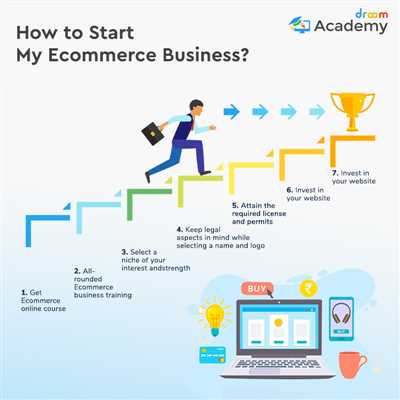
Starting an e-commerce business can be an exciting and daunting task for entrepreneurs. With the increasing popularity of online shopping, it’s no wonder that more and more people want to get in on the action. But where do you start? This article will outline the steps and strategies to successfully launch your e-commerce business today.
The first step in starting an e-commerce business is to pick a platform that suits your needs. There are many e-commerce platforms available, each with their own set of features and costs. It’s important to do your research and choose a platform that has the tools and functionalities you require to effectively run your business. Some popular e-commerce platforms include Shopify, WooCommerce, and BigCommerce.
Once you have chosen a platform, it’s time to start setting up your online shop. To ensure a smooth and efficient process, you will need to integrate your platform with other tools and services. This includes integrating payment gateways, such as PayPal or Stripe, to allow your customers to make purchases. You may also want to integrate your e-commerce platform with inventory management tools to keep track of your stock and avoid overselling.
Now that your e-commerce platform is set up, it’s time to think about your products and customers. What products do you want to offer, and who are your target customers? It’s important to carefully research your market and identify a niche where you can deliver value. Consider what sets your products apart from the competition and develop a unique selling proposition to attract customers.
Once you have your products and target customers in mind, it’s time to develop a marketing strategy. E-commerce businesses rely heavily on digital marketing techniques to increase their reach and attract customers. This can include search engine optimization (SEO) to improve your website’s visibility in search results, creating engaging content to attract customers, and utilizing social media platforms to promote your products.
Another important aspect of managing an e-commerce business is tracking your performance. You will want to monitor your sales, conversion rate, and other key performance indicators (KPIs) to ensure that your business is growing and making profit. There are various tracking tools available, such as Google Analytics, that can help you monitor and analyze your e-commerce business’s performance.
In conclusion, starting an e-commerce business can be a complex process, but by following these steps and strategies, you can effectively run your e-commerce operations. Remember to choose the right platform, develop a marketing strategy, and track your performance to ensure the success of your e-commerce business. Good luck!
How to Start an E-Commerce Business
Starting an e-commerce business can be a great opportunity for entrepreneurs to reach a larger customer base and increase their sales. However, it’s important to have a solid plan in place to ensure success. In this article, we will outline the steps and strategies to help you start and run your e-commerce business effectively.
1. Formulate Your Business Idea:
Before you launch your e-commerce business, you need to have a clear idea of what products or services you want to offer. Research your target market and identify any gaps that your business can fill. This will help you determine your niche and identify potential customers.
2. Build a Professional Website:
Your e-commerce website is the heart of your business, so it’s important to invest in a reliable and user-friendly platform. Consider using an e-commerce platform such as Shopify, WooCommerce, or Magento, which provide customizable templates and tools to help you create a visually appealing and functional website.
3. Source Your Products:
To deliver products to your customers, you need to find reliable suppliers. Choose suppliers that offer good quality products at a reasonable cost. You can find suppliers through online directories, trade shows, or by reaching out to manufacturers directly. Make sure to negotiate favorable terms and agreements to ensure smooth operations.
4. Set Up Payment Processes:
To accept payments from your customers, set up secure and convenient payment gateways on your website. Some popular options include PayPal, Stripe, and Square. Make sure to offer multiple payment options to accommodate different customer preferences.
5. Market Your Business:
Marketing your e-commerce business is crucial for gaining visibility and attracting customers. Use a combination of online marketing strategies such as search engine optimization (SEO), social media advertising, content marketing, and email marketing. Consider hiring professionals or using tools to help you track the performance of your marketing campaigns.
6. Provide Excellent Customer Service:
Customer satisfaction is key to building a successful e-commerce business. Offer exceptional customer service through various channels, such as live chat, email, or phone support. Respond promptly to customer inquiries and resolve any issues or concerns they may have.
7. Optimize for Mobile Devices:
With the majority of online shoppers using their mobile devices to browse and shop, it’s crucial that your website is mobile-friendly. Make sure your website is responsive and provides a seamless user experience on different screen sizes.
8. Expand to Multichannel Selling:
To reach a wider audience and increase your sales, consider expanding your e-commerce business to other online platforms such as Amazon, eBay, or Etsy. Each platform has its own requirements and guidelines, so do some research and choose the ones that align with your business goals.
9. Continuously Improve:
To stay ahead of the competition, continuously monitor and analyze your business performance. Use analytics tools and gather feedback from your customers to identify areas of improvement. Regularly update your products, website, and marketing strategies to adapt to changing market trends and customer preferences.
By following these steps and implementing effective strategies, you can successfully start and grow your e-commerce business. Remember that success may not happen overnight, but with dedication and perseverance, you can achieve your business goals.
Ideas vs Formulas
When starting an e-commerce business, entrepreneurs often face the challenge of coming up with ideas for products to sell and figuring out the best way to launch and run their operations. In this article, we will explore the difference between relying on ideas and following proven formulas to ensure a successful e-commerce venture.
Having great product ideas is undoubtedly important in the e-commerce industry. However, simply having a good product idea is not enough to guarantee success. Many entrepreneurs make the mistake of investing heavily in the development, stock, and marketing of a product without thoroughly researching its potential market demand or considering the costs involved.
Instead, some successful e-commerce entrepreneurs suggest following proven formulas that have been tested and proven to work. These formulas often involve step-by-step guides or processes that outline what to do, how to do it, and where to find the necessary tools or services. By following these tried-and-true formulas, entrepreneurs can minimize risks and invest their resources more effectively.
One such formula is a multichannel approach, where entrepreneurs integrate their e-commerce shop with various sales platforms and channels. This strategy increases reach and allows for more customers to discover and purchase products. It also helps in reducing the dependency on a single sales channel, which can be a risky approach.
Another formula is to invest in marketing and advertising strategies that have been proven to deliver results. This includes utilizing social media platforms, search engine optimization, and other online marketing tools to reach a wider audience and increase sales.
Formulas also offer entrepreneurs a checklist of tasks to ensure that nothing important is overlooked. This can include everything from setting up a user-friendly website to optimizing product listings, ensuring smooth operations, and delivering exceptional customer service. By following these tasks in a systematic manner, entrepreneurs can streamline their processes and increase their chances of success.
On the other hand, relying solely on ideas can be risky. While some entrepreneurs have achieved great success by launching unique and innovative products, it’s important to note that not every idea will resonate with customers. By following a proven formula, entrepreneurs can minimize the risk of launching a product that may not have a market demand.
In conclusion, while having great product ideas is important, following proven formulas can greatly increase the likelihood of success in the e-commerce industry. By integrating ideas with established processes and strategies, entrepreneurs can more effectively invest their resources, reach their target audience, and deliver a great customer experience.
Tips to run an ecommerce business successfully

Running a successful ecommerce business requires careful planning and effective execution of various strategies and processes. To help you navigate through this complex and competitive landscape, here are some tips to ensure the smooth operation and growth of your online store:
- Start with a solid business plan: Outline your business goals, target audience, product offerings, and marketing strategies.
- Choose the right ecommerce platform: Select a platform that suits your business needs, offers a wide range of features, and integrates well with other tools and services.
- Invest in high-quality product photography: Your product images play a vital role in attracting customers, so invest in professional photography to showcase your products effectively.
- Optimize your product listings: Use relevant keywords, detailed descriptions, and clear product specifications to improve search engine visibility and help customers find your products easily.
- Pick the right pricing strategy: Consider factors such as production costs, competitors’ prices, and market demand when setting your prices to ensure profitability and competitiveness.
- Offer a seamless checkout process: Simplify the checkout process to reduce cart abandonment and increase conversion rates. Minimize the number of steps, provide multiple payment options, and display trust badges to instill confidence in your customers.
- Integrate multichannel selling: Expand your reach by selling on multiple online platforms and marketplaces. This allows you to tap into different customer bases and increase your sales potential.
- Deliver exceptional customer service: Respond promptly to customer inquiries, provide accurate and helpful information, and address any issues or complaints effectively. Happy customers are more likely to become repeat buyers and advocates for your brand.
- Track and analyze your performance: Use analytics tools to monitor key metrics such as website traffic, conversion rates, and customer behavior. This data will help you identify areas for improvement and make data-driven decisions.
- Stay updated with industry trends: Ecommerce is a fast-paced industry, so it’s important to stay informed about emerging technologies, new marketing strategies, and changes in consumer behavior. Keep learning and adapt your strategies accordingly.
By following these tips, you’ll be well-equipped to run and grow your ecommerce business effectively. Remember that success doesn’t happen overnight, but with dedication, persistence, and continuous improvement, you can achieve your goals in the exciting world of e-commerce!
Launch your ecommerce business today

Starting an ecommerce business can be a daunting task, but with the right tools and strategies, you can successfully launch and grow your online shop. In this article, we will outline the steps and processes to help you effectively start your ecommerce business today.
1. Define your business idea: What products or services do you want to offer? Research the market to determine what is in demand and what potential customers are looking for.
2. Choose a platform: Select an ecommerce platform that suits your business needs. Consider factors like cost, features, and ease of use.
3. Invest in a great website: Your ecommerce website is your virtual storefront, so you want it to be visually appealing, user-friendly, and easy to navigate. Consider hiring a professional web designer to give your website a polished and professional look.
4. Integrate multichannel selling: Expand your reach by selling your products on multiple platforms, such as social media sites, marketplaces, and search engines.
5. Define your processes and tasks: Outline your order management, inventory management, and shipping processes. This will help you efficiently run your ecommerce operations.
6. Deliver exceptional customer service: Customer satisfaction is crucial for the success of your business. Have a customer service plan in place to address customer inquiries, concerns, and issues.
7. Market your business: Use various marketing strategies, like social media advertising, search engine optimization (SEO), and content marketing, to increase your visibility and attract more customers.
8. Track your performance: Regularly monitor and analyze your sales, conversion rate, and website traffic to identify areas for improvement and make data-driven decisions.
9. Reduce costs: Look for ways to optimize your operations and reduce unnecessary expenses. Use tools and software to automate tasks and streamline your business processes.
10. Continuously learn and adapt: Stay updated with industry trends and evolving customer preferences. Rely on customer feedback and market research to make necessary adjustments to your business.
Launching an ecommerce business requires careful planning and execution. By following these steps and implementing the right strategies, you can effectively start and grow your online business.
So, what are you waiting for? Start your ecommerce business today and join the thousands of entrepreneurs who are making their mark in the e-commerce world!
Outline your processes
When starting an e-commerce business, it’s important to have a clear outline of your processes. This will help you stay organized, track your performance, and effectively manage your operations. Here are some steps to help you outline your processes:
- Pick the right platform – Choose an e-commerce platform that suits your business needs. There are many options available, so make sure to research and compare features, costs, and customer reviews.
- Outline your tasks – Identify all the tasks you need to complete, from product sourcing and inventory management to marketing and customer service. Create a checklist to ensure you don’t miss any important steps.
- Integrate multichannel sales – If you want to reach more customers, consider selling your products on multiple platforms such as your own website, social media, and online marketplaces. Integrate these channels into your processes to maximize your reach.
- Deliver great customer service – Customer satisfaction is crucial for the success of your e-commerce business. Outline how you will handle inquiries, complaints, and returns to ensure a positive customer experience.
- Track your performance – Set up tools to track your sales, website traffic, and marketing efforts. Analyze the data to identify areas of improvement and make data-driven decisions.
- Invest time and resources – Establish a timeline and allocate resources to each step of your processes. This will help you stay on track and ensure that each task is given the attention it needs.
- Monitor your costs – Outline your expected costs, such as inventory, marketing, and platform fees. Regularly review and analyze your expenses to identify areas where you can reduce costs and increase profitability.
- Offer great products and services – Research your target market and assess the demand for different products. Make sure to offer high-quality products that meet customer needs and provide exceptional service.
- Stay updated with trends and strategies – The e-commerce industry is constantly evolving, so it’s important to stay informed about the latest trends and strategies. Regularly read articles and guides to stay ahead of the competition.
By outlining your processes, you will have a clear roadmap to follow when starting your e-commerce business. This will help you run your operations more efficiently, deliver a great customer experience, and increase your chances of success in the online marketplace.










